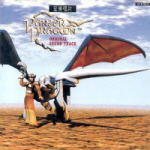Panzer Dragoon Original Soundtrack
 |
Album Title: Panzer Dragoon Original Soundtrack |
| Record Label: PolyGram |
|
| Catalog No.: POCH-2219 |
|
| Release Date: March 25, 1995 |
|
| Purchase: Buy Used Copy |
Overview
Panzer Dragoon was the first in a line of pioneering Sega games featuring militaristic storylines, flighty gameplay, and apocalyptic landscapes. Yoshitaka Azuma exploited the capacity of the Saturn to produce a pioneering score for the title back in 1995 that superbly fitted the settings and gameplay. The resultant soundtrack was given three main releases, the primary release Panzer Dragoon Original Soundtrack, a shortened Panzer Dragoon Original Full Sound Version, and a slightly enhanced Panzer Dragoon Remastered Soundtrack. Time for a closer look at the first of these…
Body
The opening theme immediately reflects the epic quality of the game. Yoshitaka Azuma blends orchestral, electronic, and rock elements into an ever-evolving 6:27 composition. Whether the surprisingly funky sections at 2:30, the deep and beautiful interludes, or the dramatic climax, the whole composition comes together brilliantly and superbly complements the visuals. This track also really helps to bring the album together since it recounts several of the melodies heard in subsequent stage themes. For example, “Worms” expands upon the first section of the opening theme with its gritty bass riff and choral overtones, while the more elaborate “Assault” recounts the hybridised soundscapes of earlier themes for a particularly enduring mission. In addition to working so well in context, these tracks really reflect Azuma’s individuality as a new age composer too.
There are a fair few more intense themes on the soundtrack. Boss themes such as “Sudden Turn” and “Confrontation” really compel listeners with their dynamic bass riffs and distorted soundscapes. A few others sound a little too transient and low-key though, such as “Reactivation” and “Flagship”, so have a lower impact in and out of context. One of the last stage themes, “The Imperial Capital Set Ablaze”, brings a lot of dynamism to the by mixing the soundtrack’s characteristic rocking bass lines with punchy brass cues. It sounds a little simple and one-dimensional out of context, but has a great effect in the gameplay. The final stage theme “Conclusion” is also fascinating with all its orch hits and electronic distortions. Essentially there is enough variety and dramatic buildup to keep listeners entertained throughout the playtime.
Away from the various electro-acoustic works, Azuma was offered the exuberance of working with a full orchestra on three of the main themes. “Main Title” blends the composer’s dramatic melodies and Tomoyuki Hayashi’s rich romantic orchestration. The result is easily the masterpiece of the soundtrack. The first stage theme “Flight” has a similar quality to it, but is more uplifting and less cinematic. The orchestration is relatively straightforward, relying mainly on sweeping strings, yet there are experimental moments such as the dabs of chalumeau clarinet. It’s certainly effective in and out of context. Finally, there is an emotional reprise of the main title theme for the staff roll, written in the style of a military anthem. At the end of the album, the three themes receive their original synthesizer renditions, though sound comparatively hollow. There is also an exclusive sound effects collection.
Summary
Overall, the Panzer Dragoon Original Soundtrack ranks among Sega’s most pioneering efforts. At the time of its release, it was novel to hear streamed orchestral performances, experimental electro-acoustic soundscaping, or even cinematically developed tracks in games. While there have been technological and musical innovations since, Yoshitaka Azuma’s score still holds up well as a functional accompaniment to the game and an enjoyable individualistic listen in its own right. This original version or the remastered version both provide a comprehensive and well-presented collection of music from the game. However, the original release might fall down slightly now due to its higher pricetag and slightly lower sound quality. Either way, its worth well considering one of these albums.
Do you agree with the review and score? Let us know in the comments below!
4
Posted on August 1, 2012 by Chris Greening. Last modified on August 1, 2012.














